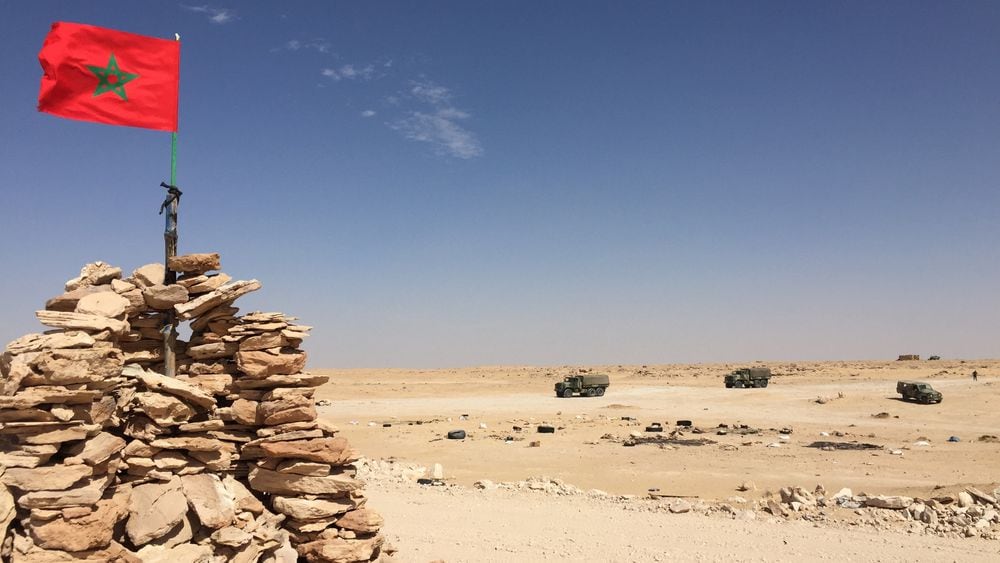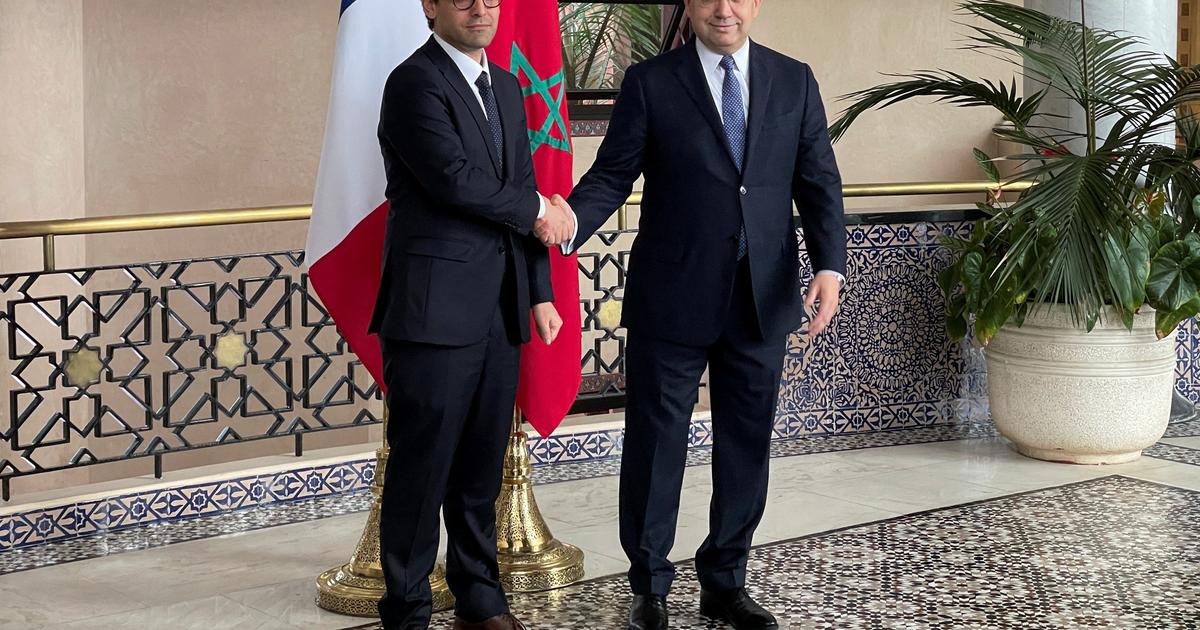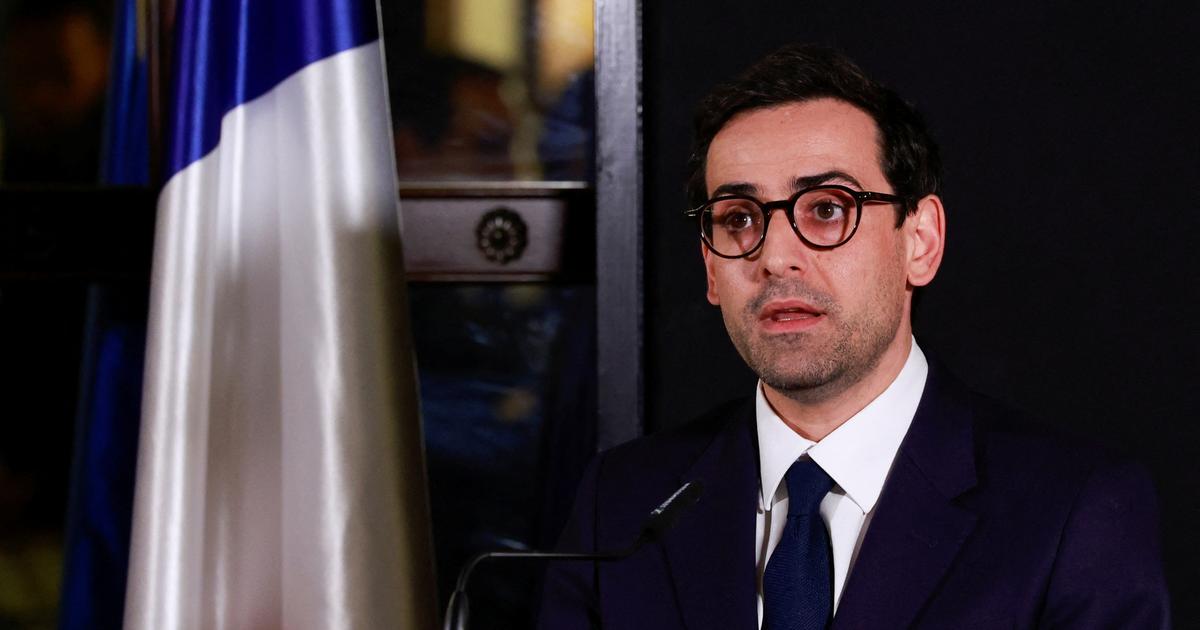The Moroccan taxi is prohibited from accessing the Guerguerat pass in the direction of Mauritania.
But the Moroccan authorities allow the journalist to enter on foot in that strip that was classified by the UN as "restricted", with prohibited access for troops and ammunition.
Seven days earlier, in the same terrain, the Polisario Front and the Moroccan Army forces exchanged fire for the first time since they signed the ceasefire in 1991. Rabat wishes to show that there is no longer any danger in this area, that trucks and it's all under control.
Despite the fact that the Polisario Front has declared a state of war, after the expulsion of the Sahrawi civilians.
There are hundreds of abandoned cars on one side and the other of a five-kilometer highway between Mauritania and Morocco.
They are remnants of the big business involved in smuggling stolen cars from Europe to Africa.
Dozens of trucks await their turn to continue their way through Western Sahara to Europe, first passing through Moroccan customs.
Others go down to Mauritania.
No shots are heard.
Not at night either, say the Moroccans.
Now, the Moroccan machines are busy removing the scrap and cleaning the area.
“This is going to be unrecognizable in a week.
We are going to clean everything, ”says the same source.
“We are going to finish paving this road so that it reaches customs with Mauritania.
In 2017 we paved almost three kilometers.
Now we will complete the rest.
In about two weeks.
This road is very important for Morocco.
And also for Spain and Europe.
The fish caught by the Spanish in Mauritania pass through here and arrive in Spain.
And many Spanish products also go down to Africa.
They go down to Spanish horses and cattle ”.
According to various sources consulted, luxury cars stolen in Europe, hashish that comes down from Morocco to Mauritania, and cocaine from Colombia, which goes up from Mauritania to Europe, passing through Western Sahara, also circulate along that border.
“We only want the law to be observed,” says the Moroccan authority, “we want wealth to be promoted between countries.
That the Polisario rebels stop cutting traffic ”<.
There is a cheerful atmosphere in the Moroccan customs, of victory.
The signs of the protest of the Sahrawis, who had blocked the road since October 21, still remain.
You can still see a great phrase that they painted in Spanish: “No a la brecha de Guerguerat”.
You can see the remains of the tents that they themselves burned when the Moroccan soldiers forced them to flee.
There is a tin of tomato left, a packet of coffee.
And a few meters away, the Moroccan military.
The soldiers build a wall of sand 20 kilometers east of the Guerguerat highway.
And in addition, they are extending 200 kilometers to the east the wall that they began to build in 1980 under the reign of Hassan II and that runs 2,700 kilometers in the desert.
That wall will now reach the border with Mauritania, according to the head of the Government, Saadedín el Otmani to Reuters.
With which, the Guerguerat strip will be cordoned off.
The Polisario Front will no longer be able to block the road.
"We are securing the entire area," says Morocco's highest civil authority on the ground.
“And we are doing it in coordination with Mauritania.
The terrorists of the Polisario Front will no longer be able to threaten every year to block the race of the Paris-Dakar rally, which passes through here.
They will no longer be able to block the passage of more trucks, as they have done these three weeks ”.
The "Stop" that the Sahrawis had painted on the asphalt has already been crossed out.
And the graffiti in Spanish of "no to the Guerguerat gap" will take very little to be erased.
For the Polisario, the political battle of the "gap" is lost, but the "war" is not.
The representative of the Polisario Front to the European Union, Oubi Bouchraya, points out in a telephone conversation from Brussels: “For us the Guerguerat was of great political importance until November 13.
It was an example of the passivity of the Minurso [the United Nations Mission for the Referendum in Western Sahara] in the face of an illegal breach and of the arrogance of Morocco to do whatever it wants.
But now, our objectives vary, they are no longer political, but based on military calculations.
The Guerguerat is just one part of the more than 2,700 kilometers that run from north to south in Western Sahara.
And we are making specific attacks throughout that territory ”.
Bouchraya adds that "the Polisario's war machine" has only just started, it is "warming up."
“Morocco is installed in the logic of denying the attacks.
Everyone knows that there have been fatalities in the Moroccan Army, but they have not denied it.
It's only a matter of time before I start to recognize it. "
Trafficking of people and goods began in Guerguerat in 2001. Little by little it increased.
In 2005 Morocco installed its customs and about four kilometers to the south Mauritania installed its own in 2010. Only when Morocco began to pave the road in 2016 and 2017 did the Polisario Front decide to block the road to denounce what it considers a “plunder” of resources from Western Sahara by Morocco.
His representative to the European Union points out: “We are often asked why we did not protest against the breach in its day.
It should be borne in mind that it was opened in 2001, when there was a political process under way led by the American James Baker [UN envoy for Western Sahara] in order to organize a referendum.
And we didn't care about that gap.
It was an act of good faith on our part to ignore the gap.
But year after year the UN has given up on the referendum.
And now it has been a year and a half without appointing an envoy for the Sahara.
The situation was already untenable ”.
Next to the Moroccan customs post, in Guerguerat there are several cafes and some small pensions.
Taxi drivers say that before the pandemic there were lines of trucks of up to four kilometers.
Truckers could wait up to two days.
The electric current works from the afternoon, when the generators start.
In about two weeks the paving of the remaining kilometer and a half of road will be completed until reaching Mauritania.
A few meters from the customs post, in the direction of Dakhla, Morocco is paving several kilometers of land to build an airstrip.
Rabat has been promoting its relations with African states for several decades and trafficking through Guerguerat continues to increase.
A neutral source familiar with Western Sahara points out: “Morocco has got what it wanted, which is a direct access to Mauritania.
And he has done it without staining his hands with blood.
The Guerguerat road connects them not only with Mauritania, but with Africa.
Through it they will get their fruits.
And also the electricity they intend to export.
Because they could do it across the sea, but it would be much more expensive.
Morocco has reason to be happy.
And besides, France protects him.
And the UN is not going to tell him anything ”.















